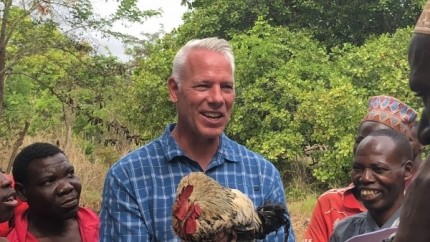
When Wayne and his family decided that they wanted to support some charities, they were looking for organizations that would provide the most value for their money. They ended up choosing Global Aid Network (GAiN) as one of the charities, specifically supporting the Water for Life Initiative project in Tanzania by providing a deep-capped water well to the Nakalonji village.
It was at a GAiN event where Wayne heard about the opportunity to go on a LIFE Team Vision Trip to Tanzania and see the well he gave. He ticked off a box on a response card, indicating that he was interested in learning more. Just a few months later, he was on a plane to Tanzania with a team of other GAiN donors and some GAiN staff.
VISITING THE WELL IN NAKALONJI
To get to the village of Nakalonji from where they were staying, the group had to make a two-and-a-half hour drive on dangerous roads, in what seemed to be the middle of nowhere. They followed the road all the way to the end, which stopped right at the village.
Before the provision of a water well, the people of Nakalonji had to walk and/or bike four kilometers away from the village to get any kind of water.
Wayne and the team were able to go there to get a glimpse into what life was like before the village received its well.
“They just dug into the dry river bed in the dry season and they just scoop the water out from there. It was pretty murky and gross looking,” Wayne remembered.
The dirty water that villagers were gathering left them sick. They reported getting cholera (a waterborne disease that can cause diarrhea and dehydration, and can even lead to death if untreated) as a result of drinking the contaminated water.
When the village received their water well, they no longer had to worry about walking too far and contracting illnesses from the water they consumed. So, when the village learned that Wayne would be in town, they took the opportunity to let him know how much his gift had impacted their lives.
“A lady [from the water committee] was there with all the village leaders and she had three pages that she read out about what the [water] well meant to them and how it had changed their lives,” Wayne recalled. “When she read those three pages of what the well meant, you just kind of stand there and go, ‘Whoa, this is crazy.’ It’s just a well, right? Here in Canada, what would that mean to us? Not that much, right? But in that remote area of Africa it means life. It saves their lives and increases productivity of the people and the ladies have more chance to go to school and all of those different things.”
Wayne was also presented with a gift from the villagers – a rooster that they decided to call “Little Wayne”, as a way to thank him. While he couldn’t take it back home with him to Canada, he knew that the locals would be offended if he refused it, so he accepted the rooster and took it back to the hotel.
“I gave it to the kitchen staff and they were very happy. My wife was worried I was going to bring it home whereas the kids wanted me to bring it home!” The words of affirmation and special gift from the villagers demonstrated the appreciativeness and gratitude of the people of Nakalonji.
“It was a bit humbling actually because I didn’t want to be put up on a stage and have everyone look at me and say, ‘Oh, there’s the guy.’ I would have rather just gone and seen the well and stayed in the background a bit. Ray (GAiN Executive Director and CEO) had to point me out to them. But [it ended up being good because] I actually got to speak to the locals. I told them, ‘I would think of you when I was at home in Canada. I could try to picture what it was like here. I could picture people coming up to the well and getting water and taking it back. But [it wasn’t] until I actually got here that I could now see who you are and I know who you are now.’”
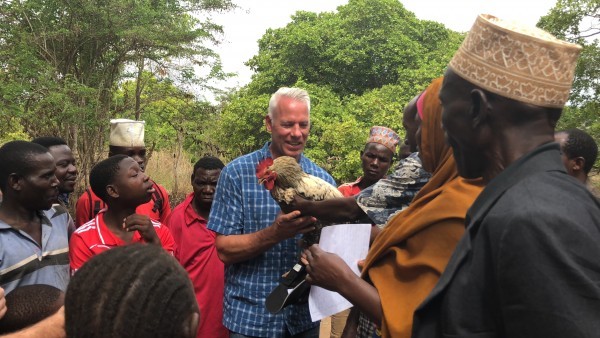
COMMUNITY
Wayne couldn’t help but notice the sense of community surrounding the wells. He was impressed by the way that communities worked together to help one another.
At a nearby village that also had a well, he noticed that stronger villagers would stick around to pump water for villagers who could not pump water for themselves.
And while visiting another village that was waiting for their new well to be completed, he witnessed local ladies preparing food for the well drillers so that they would not have to stop to cook on their own. “They were totally invested into the well. I thought that was cool. [The villagers] took ownership by all of the things they were doing there and that was really neat.”
After the village of Nakalonji received their well, the JESUS Film was shown in the village. In that village, 291 people came out and were exposed to the story of Jesus.
Community development trainings were also held in Nakalonji to round out the wholistic impact of the well. Ninety-nine locals learned about simple but life-changing hygiene practices, such as hand washing and waste disposal, through the local hygiene and sanitation training. In a gender sensitivity training, 109 men and women attended a facilitated discussion on gender roles and expectations, giving women a safe space and opportunity to have a voice. And finally, a water committee training was hosted for seven villagers who were elected by their village to manage and care for the well.
To help understand the full scope of what GAiN does in Tanzania, the team got a chance to see what an actual showing of the JESUS Film looked like in a remote village called Kitandi Shuleni.
“It was pitch black out. There were no streetlights, there was no street, no sidewalks. It’s just a village that is one-third rubble. People are sitting outside cooking on these open fires and [the local team] gave us a phrase to say to go out and invite people to come to the movie. So we walked out in little groups, walking down the dusty lanes. That really struck me how they were living with just about nothing.”
Five-hundred-thirty-nine people showed up and after the film was finished, eleven people made decisions to follow Jesus. Many people who attended asked for prayer from the team.
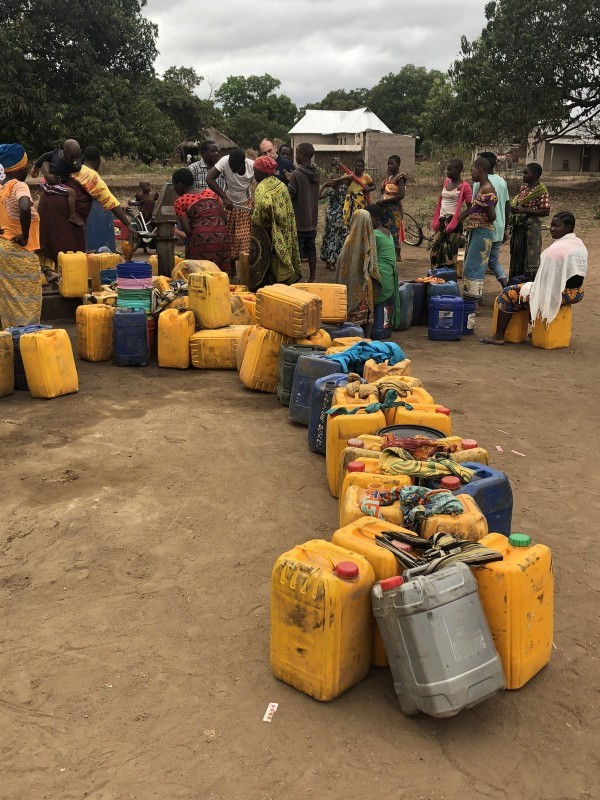
SCRATCHING THE SURFACE
Through his partnership and trip with GAiN, Wayne was able to not only see how God is transforming lives wholistically in Tanzania, but also build a relationship with the locals. He had the opportunity to see how his donation of a well made a lasting impact; revealing hope and restoring life to a remote village that was once just a vision in his mind.
“[My experience] was way better than I expected. I never imagined it would be like how it was. I didn’t think I’d fall in love with the people of Africa so much. It’s life-changing, actually, just to see the work that is being done there and how it affects their lives.”
When reflecting on what he had seen, Wayne said: “You look at the surface of the country and the buildings and the lack of things. We have so many things here. They don’t have any of that. But once you scratch the surface there’s so much joy there and happiness. And they had that spirituality that we don’t have; that ability to worship and pray. I thought, ‘Man, they have more than we do, actually.’ We have all of these [material] things but those things stop us from seeing God as clearly [as they do]. That’s what really surprised me — seeing the depth of their worship. That joy that is just below the surface.”
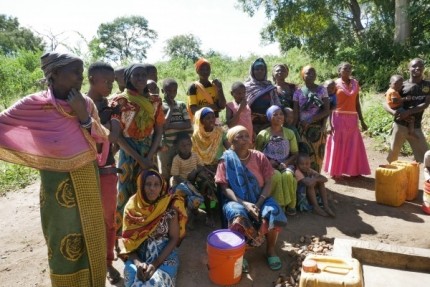
Women love to talk, that is a universally shared characteristic of women in community. It is certainly true of the women in the village of Chipunda in southern Tanzania. The well is a social place for this community. When women come with their children to collect water, they stay and talk with the others that have come. They talk about their families and their farms, their relationships and the hardships they are facing. They laugh and cry together. This is the mortar that holds the bricks of a community together, love and care for one another.
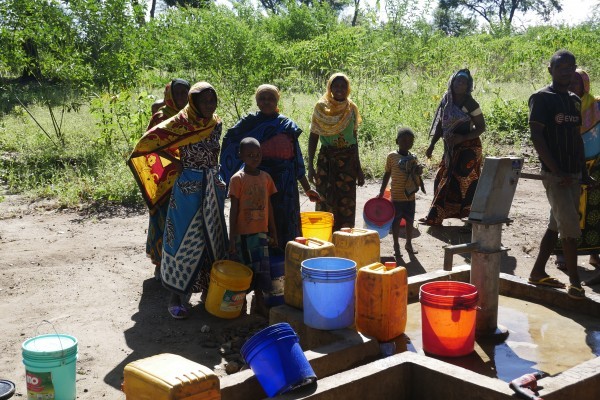
They still did all of this before the deep-capped well was provided for them by Global Aid Network. But instead of enjoying the social aspects of collecting water in a safe place that’s near to their home and from a well that provides clean water for them and their families, they were traipsing through the jungle in search of any water source, clean or dirty, and hauling it back to their homes, day and night. They were suffering from many water-borne diseases that they would often debilitate them, making it even hard to get water.
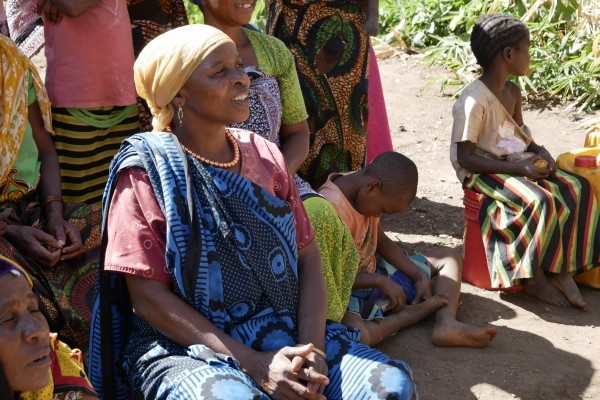
Now they get to enjoy time together at the well, free from the suffering that they lived in for so long. Women will be women, no matter what they do, but they shouldn’t have to suffer while they do it.
Let’s remember these women this International Women’s Day.
YOU COULD HELP ALLEVIATE SUFFERING OF WOMEN, CHILDREN AND MEN BY PROVIDING CLEAN WATER TO A COMMUNITY.
GIVE TODAY
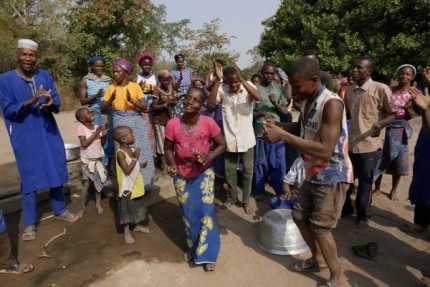
The women in Barou (Badekparou), Benin used to have to walk upwards of 10km to fetch dirty water from rivers and swamps and then carry the heavy jugs back home. Yon was one of those women. She struggled to bring water home for her children, and they suffered from a lot of sickness that was perpetuated by the dirty water that they were drinking. She often had to take her children to the clinic for treatment, which was very expensive and wasn’t even healing her children.
In Benin the responsibility of fetching water for the family falls on women. This cultural expectation creates a disadvantage for women, as putting the time and energy into fetching water means they have less time to work or spend time with their families.
Global Aid Network (GAiN) Canada desires to help reduce this barrier to clean and safe water. Water is life and because everyone deserves wholistic health, regardless of their gender, age, race, religion or disabilities, we believe that everyone should have access to clean and safe water.
With the help of people like you, we were able to do just that!
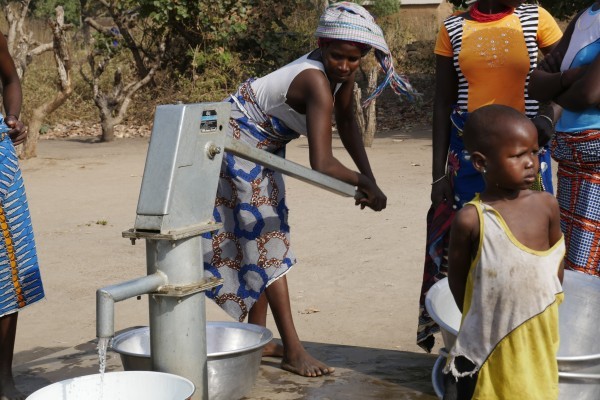
GAiN was able to provide a deep-capped water well in the village of Barou (Badekparou). Health and dignity was also restored, as another huge barrier that women in the village face was removed.
In addition to providing wells, villages also receive gender sensitivity trainings. The purpose is to foster healthy family relationships between husband and wife. By creating a safe space for women and men to have conversations surrounding gender roles and expectations, women get the opportunity to become understood, valued and respected.
Alongside the water well drilling, the opportunity to hear about God’s love was made possible. Yon got to see the JESUS film, in partnership with the JESUS Film Church Planting Strategy. After seeing the story on screen, she decided to put her trust and hope in God. She was then welcomed into a caring, local church community.
Yon praised God for the life that He has given her and the healing he has brought to her children. She was so happy that she started dancing for joy right next to the well, and before we knew it the entire crowd joined in with drumming, clapping, singing and dancing. God has truly brought joy to these people.
DO YOU WANT TO HELP END THE CYCLE OF INJUSTICE?
GIVE TODAY
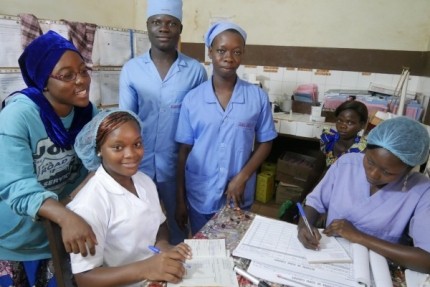
“The gender training has had a huge impact on our households,” one woman from the village of Fignonhou, Benin, told us after we had conducted a gender sensitivity training in her community. “There was a lot of quarrelling between husbands and wives before. Now, few people quarrel. Violence against women has decreased.”
When another woman first went to a hygiene and sanitation training put on by GAiN [as part of the Maternal Newborn Child Health (MNCH) project, in partnership with the Government of Canada] her husband was angry with her for going without his permission. However, when he noticed the useful information she was learning and how it improved their lives, he was happy to see her participate in more training and activities.
Sometimes it is these small improvements in women’s lives that give hope. When before, women were devalued and forbidden to take action and responsibility, now, they are now trusted and empowered to create change. They are given a new status within their homes and communities.
This year for International Development Week (IDW), the theme is “Together for Gender Equality.” Through our projects, one way that we aim to restore justice is by addressing gender inequality in the developing countries in which we work.
After 13 years of providing deep-capped water wells in remote areas, we’ve seen the power that clean water has to transform individuals and entire villages – not only to improve health but also the quality of life for women.
Over the last two years, we’ve been able to help mothers and children through the MNCH project by:
- Providing water wells in the village near medical clinics. This not only reduces diseases but also eases the burden of time and physical demands for women and girls, allowing them to attend school, focus on the needs of their families and other economic activities.
- Providing hygiene and sanitation education, as well as handwashing stations.
- Equipping village champions with the tools to promote proper hygiene and community health.
- Improving local health services by providing clinic trainings for village health workers to improve their skills.
- Empowering women through gender sensitivity training for both men and women. The goal is to foster healthy family relationships and ensure that the rights of women are better understood and respected, as their participation in decision making and control of resources is valued.
Learn more and see how you can join us in becoming change-makers in advancing gender equality in countries like Benin and Togo.
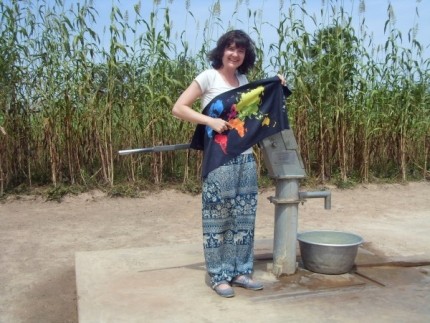
Q&A With Salome, WFLI Benin Vision Trip Participant
Salome from Germany recently participated in Global Aid Network (GAiN) Canada’s 2018 Benin Vision trip.
Q: How did you first hear about GAiN?
A: I heard about GAiN some years ago when my brother and his wife were involved in helping with one of GAiN Germany’s projects. They recommended that I go on one of GAiN’s mission trips and I ended up going on my first trip to Haiti with GAiN Germany in 2015.
Q: How did you end up hearing about the trip and what made you want to go?
A: In 2016, I sponsored a well for [Benin] through GAiN’s Water for Life Initiative. In 2017, I was informed that it had been assigned to a village in Benin. I was quite curious to see it with my own eyes – especially if there is really a plaque with my name on it. Unfortunately, GAiN Germany did not offer a trip to Benin, however, they let me know that GAiN Canada offers a vision trip. Thus, I contacted the Canadian office and was lucky to meet Lily, GAiN Canada’s LIFE Teams Manager. The trip was scheduled for the southern part of Benin (where the GAiN office and accommodation are located), however, my well was 600 km north. Lily and the GAiN Benin staff helped organize an individual three day trip for me to see my well in the north. Still, today, I appreciate their efforts.
Q: What did you do and see while on the trip?
A: We visited several small villages, every day seeing a different aspect of the Water for Life Initiative:
- Drilling of the well
- Flushing of the well (when an air compressor pushes the water out of the top of the well to clean out dirt and debris from drilling, causing clean water to spray out of the well)
- Watching presentations from GAiN partners DRIME (Disciples Ready in Mobile Evangelism) and The JESUS Film Church Planting Strategy
- Attending Hygiene and Sanitation Trainings
- Celebrating in a newly planted church and experiencing African worship
- Taking part in the weekly staff and prayer meetings
- Visiting the village that I had sponsored a well for [it is called Dipokor Fontri] and talking to the residents of the village
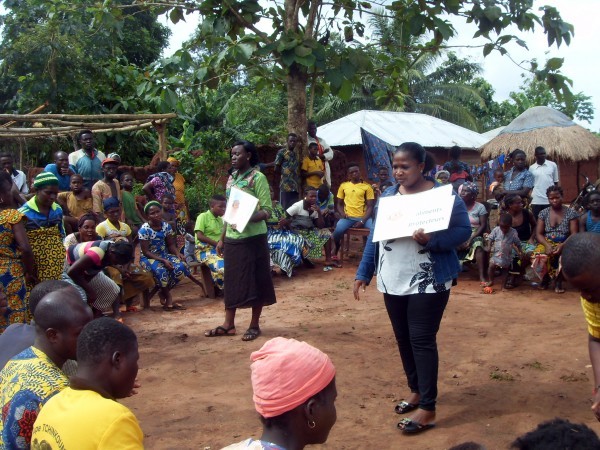
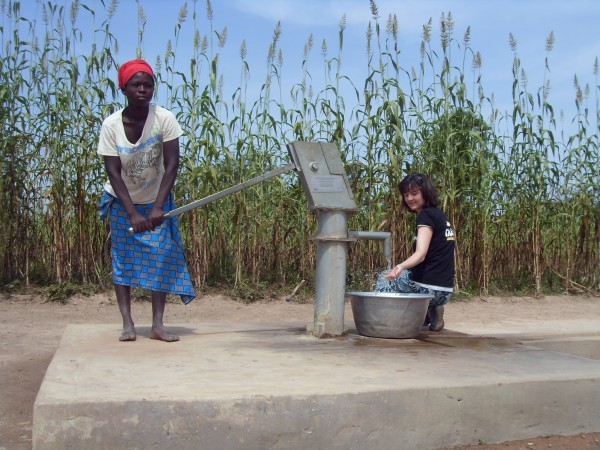
Q: How was the journey from the GAiN Benin office to the village of Dipokor Fontri?
A: The journey from the south (GAiN office) to the north (my well) and back was really exciting. It took me 11 hours one way and an additional hour for a repair stop because the car’s gas pump was malfunctioning. This was on the trip to the north and for a moment I thought I would never arrive at my destination. I sat in the shadow of the “open air garage” that we found along the way, and prayed while eight Africans cleaned the pump. Finally, it worked and we could continue on our trip.
Most of the distance was on a potholed asphalt road. Overtaking manoeuvres of heavy trucks and overloaded cars, as well as lane changes, caused me to close my eyes from time to time. On the other hand, I opened my eyes widely to catch all the sights of small villages, busy wives, simple markets on the roadside, churches, mosques and fields with interesting plants and much more. The closer we came to my village the more the road changed into a path and the last kilometer I had to walk through fields like a scout.
On this trip I was accompanied by a GAiN Benin staff member and a driver. Communication was in french. We had two overnight stays in a hotel, in the typical local style, in a quite big city three hours away from my village.
Q: What were some highlights of the trip?
A: Seeing how motivated, well-organized and dedicated the local staff is to demonstrating the love of God. Seeing the partnership of the JESUS Film Church Planting Strategy and seeing a screening of the JESUS film in the village. Visiting Dipokor Fontri. I got to see the impact that a well makes in the lives of the people and to talk to inhabitants of the village and see their gratefulness. As a present, they gave me 25 kg of sweet potatoes and yams from their fields. The chief of the village said: “We do not have a lot. But what we do have we would like to share with you.”
Q: How did you see God’s love demonstrated in the field?
A: I was encouraged to see the local staff live out love in everything they do. During drilling the GAiN staff sleeps in the huts among the villagers and not in hotels. This way they show humility and that they are just one of them. During weekly staff meetings the local staff not only pray for the work but also for the donors. The trainers are well prepared for the hygiene and sanitation trainings.
In partnership with the JESUS Film Church Planting Strategy, the staff involved contact local pastors before the drilling of a well and stay in contact with them after new people join the church.
Q: What were your expectations of the trip before they left and how were they compared to what you experienced?
A: I expected that we would see the well in some villages and hear the story of how it was constructed. My expectations were exceeded. I did not expect that I would be on spot to see a well being drilled and see the flushing of the well or see a showing of the JESUS film and attend a hygiene and sanitation training.
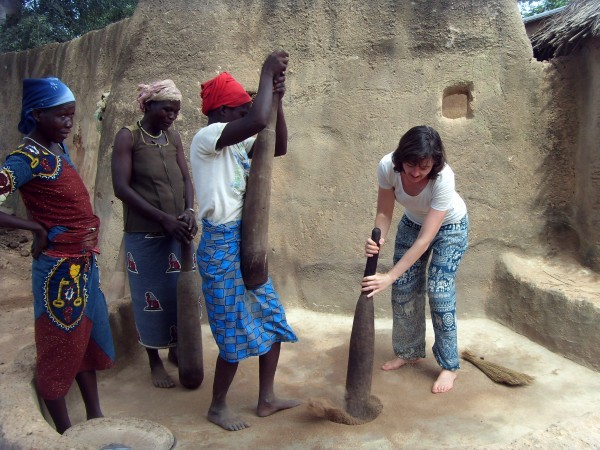
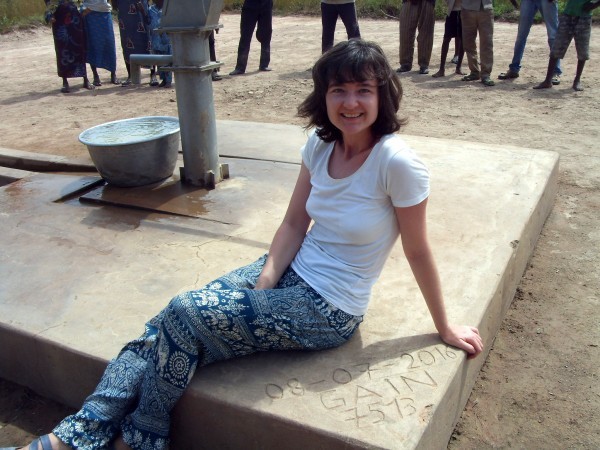
Q: Would you recommend that people go on a vision trip with GAiN?
A: Yes, I would definitely recommend going on a vision trip. It’s great to see the impact of a donation – not only from photos in an annual report but on site.
Q: Do you have any other experiences or comments that you would like to share?
A: I believe in Water for Life Initiative’s wholistic concept that includes the following:
- Providing wells- because clean water in the villages saves lives.
- Partnering with the JESUS Film Church Planting Strategy to share the message of God’s love and connect people to local churches and further resources for spiritual growth.
- Hygiene and Sanitation Training teaches people who have no access to education about proper hygiene habits and how to avoid diseases.
- Ensure maintenance of the wells by:
- Having a well committee in each village
- Training and equipment of regional technical staff for repairs
- Monitoring – staff regularly return to the villages to manage the wells and the work of the committee (this guarantees the functioning of the well for long-term sustainability).
All of this is done by locals!
GO ON A LIFE TEAM TRIP AND EXPERIENCE THE IMPACT OF A DONATION.
I AM INTERESTED IN A LIFE TEAM TRIP
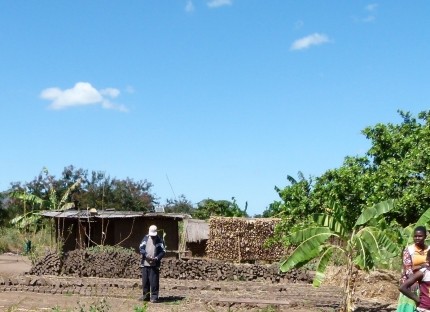
Brick making is a significant source of income for the people in Southern Tanzania as the soil is strong.
The process of making bricks involves creating a pit of mud, packing the wet soil into forms to make rectangular shapes and then baking them over a fire.
However, the challenging thing about this task is that is requires a lot of water, which is difficult for most villages to collect.
Chilaile is no exception.
Water is scarce and almost non-existent in the dry season.
But now that GAiN has provided a deep-capped water well, the village has been transformed.
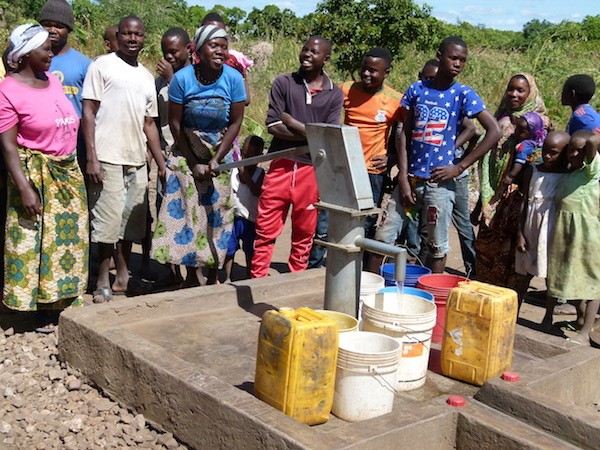
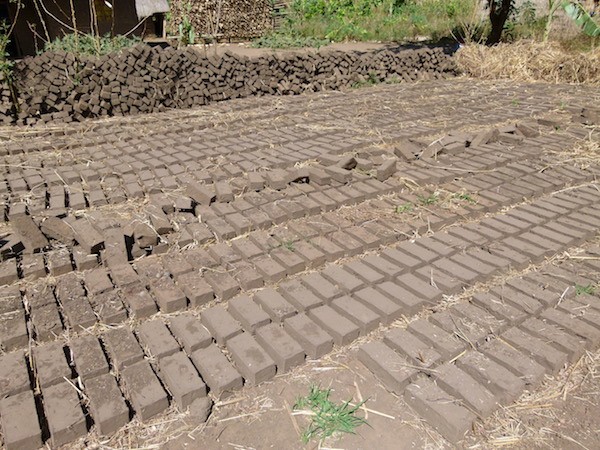
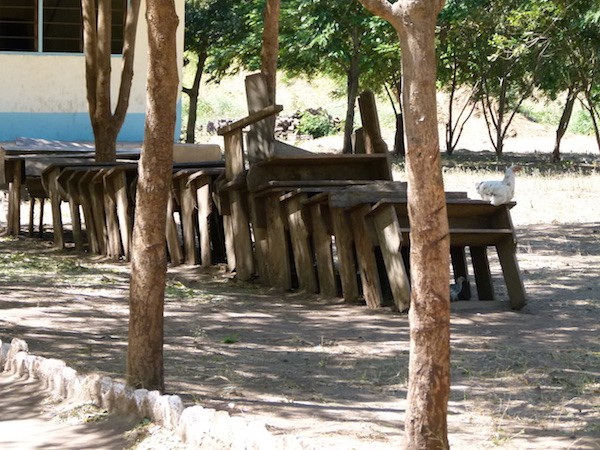
Not only has the well improved the local economy, it has made significant impact on the health of the village.
Villagers used to suffer from a lot of waterborne diseases such as dysentery and cholera. Today, they are drinking clean and safe water.
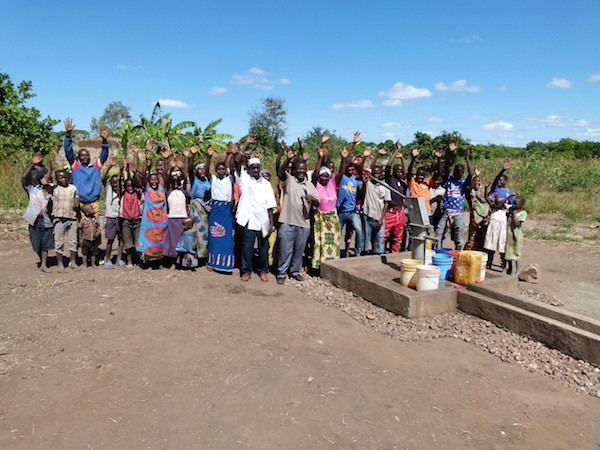
WILL YOU HELP OTHER VILLAGES RECEIVE THE GIFT OF CLEAN AND SAFE WATER?
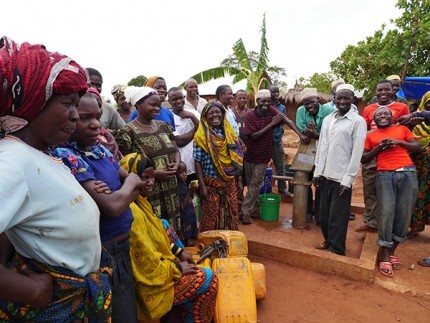
To see the health a village, just look at the health of its children.
In African society, the lack of clean water places a large burden on women because they are often tasked with the responsibility of collecting water for the family.
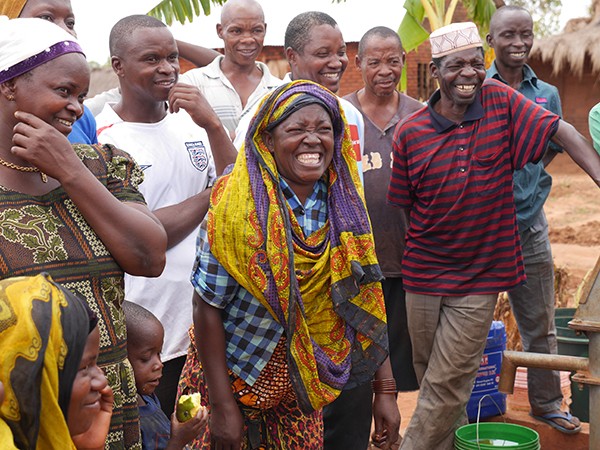
So we were delighted when we visited the village of Kariakoo, Tanzania and asked how the addition of a deep-capped well has impacted the village. A woman in the crowd answered, “Now we have more time to make babies!”
This answer was met with a roar of laughter but as funny as the statement is, it is true. Her statement is a reflection of the impact that clean water can have, not just on one woman but on a family and a whole community.
This lady wanted more children, but because of the hardships surrounding a lack of clean water, she didn’t have the capacity, time or health to bear and care for another child. Now with the deep-capped well in place, she has improved health and more time to devote to nurturing her family.
WANT TO MAKE A DIFFERENCE IN THE LIVES OF FAMILIES? THIS WORLD WATER DAY, MAKE A DONATION TOWARD A WATER WELL TO IMPROVE THE LIVES AND HEALTH OF FAMILIES!
GIVE NOW
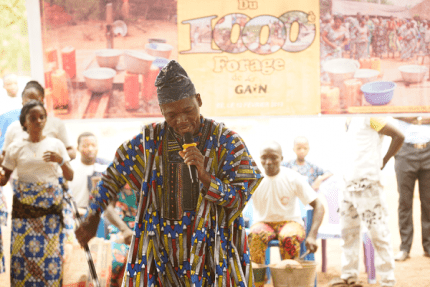
GAiN’s Water for Life Initiative has reached a new milestone – providing 1000 communities with access to safe water in Benin! This translates to approximately 1 million people who have now benefited from GAiN’s water program.
The 1000th village to receive a well is Koudjinnada, approximately 90 minutes north of the largest city, Cotonou. Prior to the provision of the water point, the community relied on three different nearby unsafe water sources, like hand-dug wells or swamps, that are harmful to the community. When we visited, one of those old water wells was closed. Rumour has it that some time ago, someone was fetching water from that well and fell to their death, resulting in the closure of the well. Needless to say, the community was ecstatic when a safe water point was provided in the community.
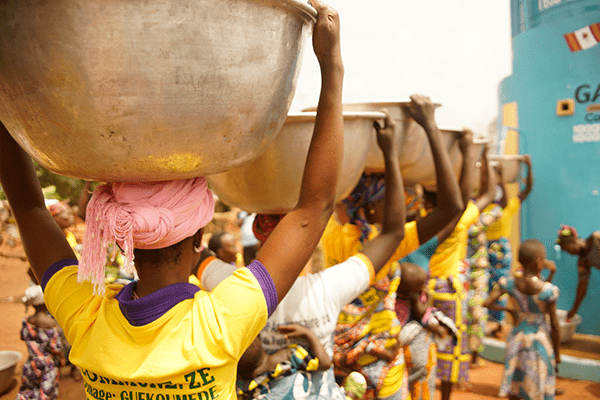
The water point itself is a little different than our normal hand pumps, as it has a water tower connected to an electric generator. Users can just easily turn a tap to fill their basins or jerry cans.
To celebrate this milestone, GAiN hosted a few days of activities in Benin. Some of the GAiN Canada staff, including Ray Sawatsky, GAiN CEO, were present for the celebration. Rod Bergen, President of Power to Change, and some of the other board members and donors, also travelled to Benin to celebrate with GAiN Benin staff.
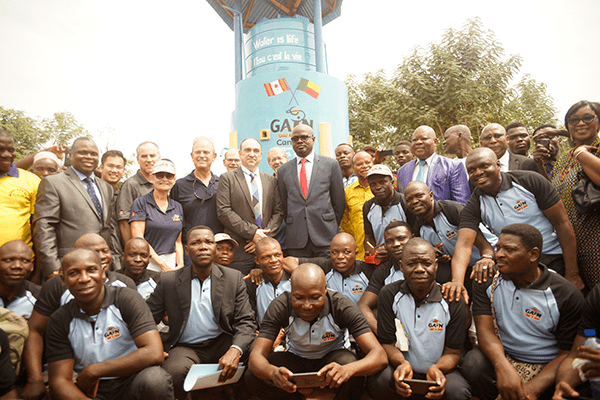
A village celebration was held in Koudjinnada on Feb. 12th, in the presence of Seidou Adambi Samou, the Benin Minister of Water, Mines and Hydraulic, and Francis Loko, the former Benin Ambassador to Canada.
The ceremony featured speeches from different officials, as well as testimony from a woman who shared the benefits of the new water point. The well was officially opened by Benin’s Minister of Water and GAiN’s CEO. Members of the local press were also in attendance.
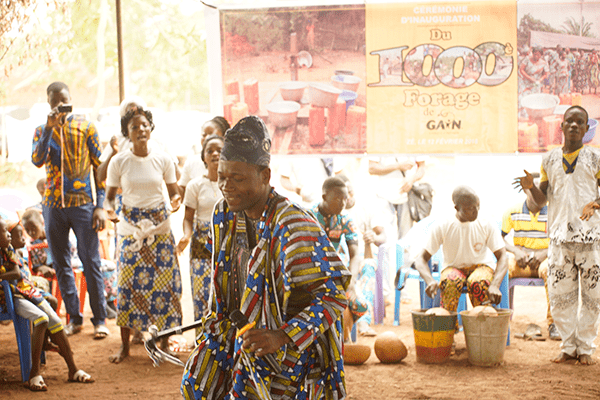
And of course, there was a lot of cultural singing and dancing!
The Celebration was followed by a dinner gala the next day, to remember the past, but also to look forward to the future of GAiN in Benin. The evening had speeches and skit performances by a local performance group.
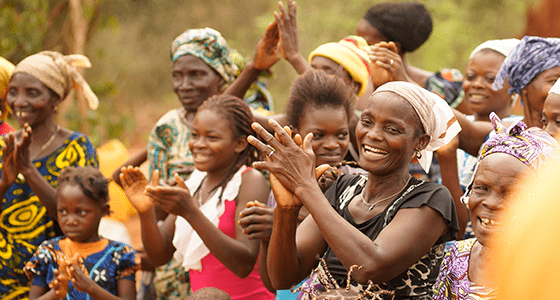
We couldn’t have reached this milestone without you. We thank you for your partnership in providing these communities with safe water sources!
WANT TO HELP BRING SAFE WATER TO MORE COMMUNITIES?
DONATE NOW!
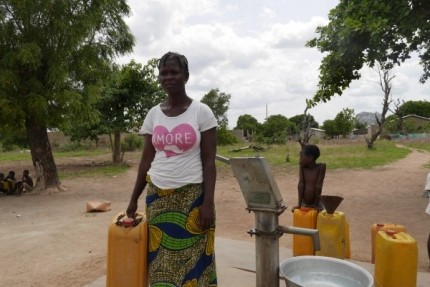
Unsafe water can cripple. It will make people sick. According to WHO, 340,000 children die each year from diarrhoeal diseases due to unsafe water and poor hygiene and sanitation. The effects of waterborne diseases are evident. People are weaker and more susceptible to infections.
Women like Pascalline, from the village of Ayedero Igbo Dogbo, Benin, faced this reality day to day. She would wonder if the day would ever come when she would no longer get stomach aches from drinking contaminated water. It didn’t help that she had to walk several hours uphill to get unclean water to drink – all with a weakened immune system and the stress and pressure of providing for the family.
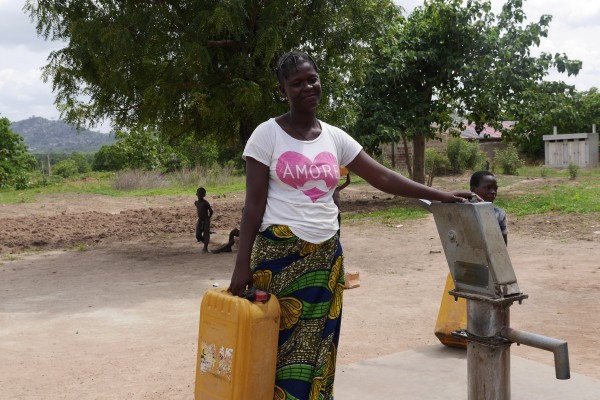
But now that a deep-capped water well has been provided, where Pascalline can access clean and safe water, she has extra time and energy to care for her family. The time she saved can now be allotted to something more productive.
“The water tastes great! It makes me feel better and stronger,” shares Pascalline.
Clean water restores people, bringing them into wellness. It restores their health and dignity – particularly in the case of women. Water gives women like Pascalline strength, power and dignity – encouraging them to dream once again and unleash their potential.
WANT TO HELP BRING SAFE WATER TO MORE COMMUNITIES?
DONATE NOW!
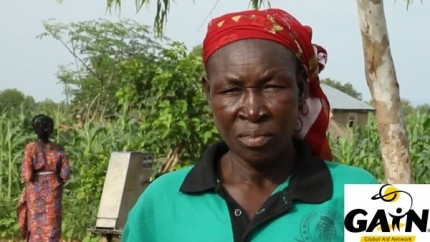
The village of Kouorou, Benin suffered from a lack of water, depending on their only water source – the swamp. The contaminated water from the swamp caused frequent sickness, meaning villagers would spend a lot of time and money in hospitals.
“We would share the same water as the animals,” Marie, a village resident of 10 years, explained. “Cows would walk to the swamp and walk in the water, which was painful to know that I am drinking the same water as them. We just didn’t have any other choice. We felt sad for ourselves because it was giving us sickness.”
Marie still remembers the day GAiN brought a deep-capped well to Kouorou. The people of Kourou rejoiced – celebrating because they knew it would be the end of suffering. “I’m so happy to have this water well in my village,” she said with gratitude.
“There is a big difference between the two sources of water,” Marie declared. “The old one was like mud water and here, this is pure clean water.”
The first change the well has brought is health to the village. Frequent sickness that occurred has slowed down, meaning villagers like Marie get to experience true wellness.
